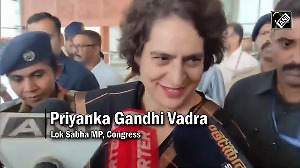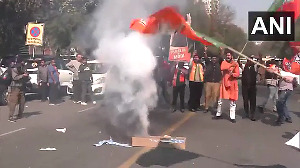 The Supreme Court on Monday halted further investigation in the January 27 Shopian firing incident involving a senior army officer, accused of leading an army convoy, even as the Centre and Jammu and Kashmir government were at loggerheads over lodging of first information report.
The Supreme Court on Monday halted further investigation in the January 27 Shopian firing incident involving a senior army officer, accused of leading an army convoy, even as the Centre and Jammu and Kashmir government were at loggerheads over lodging of first information report.
Observing that Major Aditya 'is an army officer and not an ordinary criminal', the top court directed the state government that no further investigation shall take place in the case till April 24, when the final hearing in the matter would take place.
The Centre contended that the state government cannot lodge an FIR against army personnel under Section 7 of the Jammu and Kashmir Armed Forces (Special Powers) Act for the job done in discharge of their duty, as no prior sanction was taken from the Union of India.
The state government, on other hand, argued that the army officials do not respond to the communications sent by investigating officer and think that 'they are above law'.
It said that army personnel do not have 'any licence to kill' and the state government has the 'right to investigate any cognisable offence and deaths of its own people'.
A bench comprising Chief Justice Dipak Misra and Justices A M Khanwilkar and D Y Chandrachud said 'let the matter be listed for final disposal on April 24. In the meantime, there shall be no further investigation on the basis of FIR till then'.
Three civilians were killed when Army personnel fired at a stone-pelting mob in Ganovpora village of Shopian on January 27 this year, prompting the chief minister to order an inquiry into the incident.
During the hearing, Attorney General K K Venugopal, appearing for Centre, said that under provisions of AFSPA, no FIR can be lodged against army personnel for their work done on duty and initiation of criminal action can only be done with the prior sanction of the central government.
Section 7 of Jammu and Kashmir AFSPA says 'No prosecution, suit or other legal proceeding shall be instituted, except with the previous sanction of the central government, against any person in respect of anything done or purported to be done in exercise of the powers conferred by this Act'.
Senior advocate Shekhar Naphade and advocate Shoeb Alam, appearing for Jammu and Kashmir government, cited various verdicts of the top court and said that requirement of sanction comes at the time of cognisance taken by the court and not at the time of initiating of a criminal action or filing of FIR.
Naphade said that Major Aditya does not even figure among the names of the accused in the FIR lodged on the allegation that army personnel open fired in retaliation in which three persons were killed.
"He (Major Aditya) has not been named as accused in the FIR. The column of accused in the FIR is left blank. His name also does not feature in the case diary as of now. He is just been named on the basis of allegation that he led the convoy which had opened fired on retaliation. There is no specific allegation against him," the senior advocate said, adding that the petition is infructuous.
To this, the court asked whether Major Aditya was the only person from the Army whose names features in the narrative of FIR and does the statement of Naphade means that he will not be named as an accused in future.
Naphade replied that the possibility of inclusion of Major Aditya's name among the names of accused depends on further investigation in the case.
"Then we will say that no action will be taken against him till the matter is disposed of here (apex court)," the bench said.
The senior advocate said the court had already ordered that no coercive action be taken against him (Aditya).
The bench said, "He is an Army officer not an ordinary criminal. You have to see the matter in a holistic way".
To this, Naphade said "Army officers have no licence to kill and the state has the statuary right to investigate a cognisable offence and the deaths of its own people".
Reacting immediately, Venugopal retorted: "Licence to kill? Many of our soldiers are being killed there."
The apex court thereafter listed the matter for final hearing on April 24.
The top court had on February 12 restrained the Jammu and Kashmir police from taking any "coercive steps" against Army officers, including Major Aditya Kumar, who was earlier reportedly named as accused in the case.
The FIR was registered against personnel of 10 Garhwal Rifles under sections 302 (murder) and 307 (attempt to murder) of the Ranbir Penal Code (the penal code applicable in Jamu and Kashmir).
The apex court was hearing the plea of Lieutenant Colonel Karamveer Singh, the father of Major Aditya Kumar, seeking to quash the FIR against his son.
Singh had said in his petition that his son, a major in 10 Garhwal Rifles, was 'wrongly and arbitrarily' named in the FIR as the incident relates to an Army convoy that was on bona fide military duty in an area under AFSPA and was isolated by an 'unruly and deranged' mob pelting stones, causing damage to military vehicles.











 © 2025
© 2025